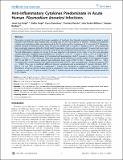Anti-inflammatory cytokines predominate in acute human Plasmodium knowlesi infections
Abstract
Plasmodium knowlesi has entered the human population of Southeast Asia. Naturally acquired knowlesi malaria is newly described with relatively little available data, including data on the host response to infection. Therefore pre-treatment cytokine and chemokine profiles were determined for 94 P. knowlesi, and for comparison, 20, P. vivax and 22 P. falciparum, patients recruited in Malaysian Borneo. Nine, five and one patient with P. knowlesi, P. falciparum and P. vivax respectively had complicated malaria as defined by World Health Organisation. Patients with uncomplicated P. knowlesi had lower levels of the pro-inflammatory cytokines IL-8 and TNF alpha than those with complicated disease (both p<0.05, Dunn's post test, DPT). The anti-inflammatory cytokines IL-1ra and IL-10 were detected in all patients in the study. IL-1ra, the most abundant cytokine measured, correlated with parasitaemia in P. knowlesi (r(s) = 0.47, p = <0.0001), P. vivax (r(s) = 0.61, p = 0.0042) and P. falciparum (r(s) = 0.57, p = 0.0054) malaria. IL-10 correlated with parasitaemia in both P. knowlesi (r(s) = 0.54, p = <0.0001) and P. vivax (r(s) = 0.78, p = <0.0001) infections. There were between group differences in soluble markers of macrophage activation (MIP-1 beta and MCP-1). P. knowlesi patients had significantly lower levels of MIP-1b than P. falciparum (DPT, p = <0.01). Uncomplicated P. knowlesi patients had significantly lower levels of MCP-1 than uncomplicated P. falciparum patients (DPT, p = <0.001). There was no significant difference between complicated and uncomplicated P. knowlesi infections. MCP-1, MIP-1b, IL-8 and TNFa increased in complicated P. knowlesi but decreased in complicated P. falciparum infections. Descriptions of human knowlesi malaria provide a comparative means to discover mediators of pathophysiology in severe P. knowlesi as well as P. falciparum malaria. Crucially, P. knowlesi may be the disease and experimental primate model for severe malaria.
Citation
Cox-Singh , J , Singh , B , Daneshvar , C , Planche , T , Parker-Williams , J , Krishna , S & Cox Singh , J 2011 , ' Anti-inflammatory cytokines predominate in acute human Plasmodium knowlesi infections ' , PLoS One , vol. 6 , no. 6 , e20541 . https://doi.org/10.1371/journal.pone.0020541
Publication
PLoS One
Status
Peer reviewed
ISSN
1932-6203Type
Journal article
Collections
Items in the St Andrews Research Repository are protected by copyright, with all rights reserved, unless otherwise indicated.

